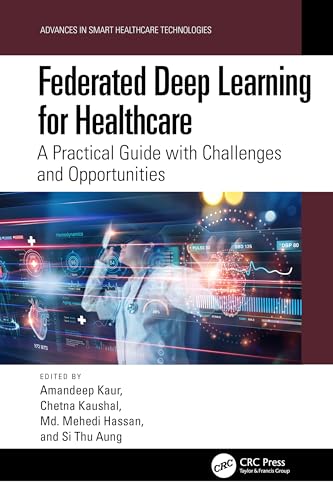
Federated Deep Learning for Healthcare
Amandeep Kaur, Chetna Kaushal, Md. Mehedi Hassan, Si Thu Aung
Questions & Answers
Federated Deep Learning (FDL) addresses data privacy and security challenges in healthcare by enabling decentralized model training. It allows for the training of machine learning models across decentralized data sources without the need to centralize sensitive patient data. This approach ensures that raw data remains on local devices, reducing the risk of data breaches and unauthorized access. FDL achieves this by:
- Local Model Training: Each institution trains its model on its own data, preserving data privacy.
- Model Aggregation: Only model updates, not raw data, are shared, minimizing data exposure.
- Encryption: Data is encrypted during transmission and storage, adding an extra layer of security.
- Differential Privacy: Techniques like differential privacy are used to protect individual data while allowing for aggregate analysis.
By doing so, FDL allows healthcare organizations to collaborate and improve models without compromising patient confidentiality, aligning with regulations like HIPAA and GDPR.
Federated Deep Learning (FDL) offers several advantages over traditional centralized machine learning in healthcare data analysis. Key advantages include:
- Data Privacy: FDL allows for decentralized training, keeping sensitive patient data on local devices, reducing the risk of data breaches and ensuring compliance with privacy regulations like HIPAA and GDPR.
- Collaboration: It enables collaborative model training across institutions without sharing raw data, fostering collective intelligence and improving model performance.
- Scalability: FDL is scalable, allowing for the training of models on vast and diverse datasets without the need for extensive infrastructure.
- Real-time Learning: It supports real-time model updates on edge devices, facilitating proactive health management and timely interventions.
However, FDL also has limitations:
- Communication Overhead: The need for frequent communication between devices and servers can lead to increased latency and bandwidth usage.
- Data Heterogeneity: Managing diverse and unstructured healthcare data can be challenging, requiring sophisticated data harmonization techniques.
- Scalability and Efficiency: Ensuring efficient and scalable FDL systems is complex, especially when dealing with large datasets and diverse devices.
- Security Concerns: FDL systems must be designed to protect against attacks like model inversion and membership inference, which could compromise data privacy.
Federated Deep Learning (FDL) facilitates information sharing among healthcare organizations by enabling collaborative model training without centralizing sensitive data. Each organization retains control over its data, which is locally encrypted and processed. Models are trained on these encrypted data, allowing for the discovery of patterns and insights without revealing individual patient information. This decentralized approach maintains model performance by leveraging diverse datasets. FDL also incorporates privacy-preserving techniques like differential privacy and homomorphic encryption to protect data during transmission and processing, ensuring compliance with regulations like HIPAA and GDPR. This balance between privacy and performance enables healthcare organizations to share information and collaborate on research and diagnostics while safeguarding patient confidentiality.
The most effective privacy-preserving methods in Federated Deep Learning (FDL) include Differential Privacy (DP), Secure Multi-Party Computation (SMC), and Homomorphic Encryption (HE). DP adds noise to sensitive information, making it difficult for attackers to link data inputs to outputs. SMC allows collaborative computing without revealing participants' data, and HE encrypts data during communication, enabling computation on encrypted data without decryption. These methods contribute to the security and confidentiality of medical data by ensuring that patient information remains private and secure throughout the training process, reducing the risk of data breaches and unauthorized access.
Federated Deep Learning (FDL) can significantly improve patient outcomes and advance medical research by addressing privacy concerns while enabling collaborative data sharing. In personalized medicine, FDL allows for tailored treatments based on individual genetic profiles, enhancing efficacy and reducing side effects. For drug discovery, it enables secure analysis of private datasets, speeding up the process and reducing costs. In disease prediction, FDL can leverage diverse data sources to identify early signs and predict disease risks with greater accuracy. By maintaining data privacy and enabling decentralized learning, FDL fosters trust among healthcare institutions and accelerates the development of innovative treatments and diagnostics.